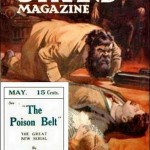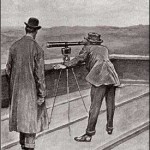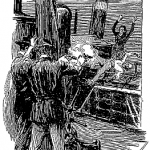“What will you give?”
“Half a sovereign.”
“A sovereign.”
“Done!” and so Ezra Girdlestone walked out of the office with full details in his hand, and departed to his hotel, where he read the account through very slowly and deliberately. It appeared to be satisfactory, for he chuckled to himself a good deal as he perused it. Having finished it, he folded the paper up, placed it in his breast pocket, and, having ordered his horse, set off to the neighbouring township of Dutoitspan with the intention of carrying the news with him.
Ezra had two motives in galloping across the veldt that October night. One was to judge with his own ears and eyes what effect the news would have upon practical men. The other was a desire to gratify that sinister pleasure which an ill-natured man has in being the bearer of evil tidings. They had probably heard the report by this time, but it was unlikely that any details had reached them. No one knew better than young Girdlestone that this message from Europe would bring utter ruin and extinction to many a small capitalist, that it would mean the shattering of a thousand hopes, and the advent of poverty and misery to the men with whom he had been associating. In spite of this knowledge, his heart beat high, as his father’s had done in London, and as he spurred his horse onwards through the darkness, he was hardly able to refrain from shouting and whooping in his exultation.
The track from Kimberley to Dutoitspan was a rough one, but the moon was up, and the young merchant found no difficulty in following it. When he reached the summit of the low hill over which the road ran, he saw the lights of the little town sparkling in the valley beneath him. It was ten o’clock before he galloped into the main street, and he saw at a glance that the news had, as he expected, arrived before him. In front of the Griqualand Saloon a great crowd of miners had assembled, who were talking excitedly among themselves. The light of the torches shone down upon herculean figures, glaring shirts, and earnest bearded faces. The whole camp appeared to have assembled there to discuss the situation, and it was evident from their anxious countenances and subdued voices, that they took no light view of it.
The instant the young man alighted from his horse he was surrounded by a knot of eager questioners. “You’ve just come from Kimberley,” they cried. “What is the truth of it, Mr. Girdlestone? Let us know the truth of it.”
“It’s a bad business, my friends,” he answered, looking around at the ring of inquiring faces. “I have been reading a full account of it in the Cape Argus. They have made a great find in Russia. There seems to be no doubt at all about the matter.”
“D’ye think it will send prices down here as much as they say?”
“I’m afraid it will send them very low. I hold a lot of stones myself, and I should be very glad to get rid of them at any price. I fear it will hardly pay you to work your claims now.”
“And the price of claims will go down?”
“Of course it will.”
“Eh, mister, what’s that?” cried a haggard, unkempt little man, pushing his way to the front and catching hold of Ezra’s sleeve to ensure his attention. “Did ye say it would send the price o’ claims down? You didn’t say that, did you? Why, in course, it stands to reason that what happened in Roosia couldn’t make no difference over here. That’s sense, mates, ain’t it?” He looked round him appealingly, and laughed a little nervous laugh.
“You try,” said Ezra coldly. “If you get one-third of what you gave for your claim you’ll be lucky. Why, man, you don’t suppose we produce diamonds for local consumption. They are for exporting to Europe, and if Europe is already supplied by Russia, where are you to get your market?”
“That’s it?” cried several voices.
“If you take my advice,” Ezra continued, “you’ll get rid of what you have at any loss, for the time may be coming when you’ll get nothing at all.”
“Now, look at that!” cried the little man, throwing out his hands. “They call me Unlucky Jim, and Unlucky Jim I’ll be to the end of the chapter. Why, boss, me and Sammy Walker has sunk every damned cent we’ve got in that claim, the fruit o’ nine years’ hard work, and here you comes ridin’ up as cool as may be, and tells me that it’s all gone for nothing.”
“Well, there are others who will suffer as well as you,” said one of the crowd.
“I reckon we’re all hit pretty hard if this is true,” remarked another.
“I’m fair sick of it,” said the little man, passing his grimy hand across his eyes and leaving a black smear as he did so. “This ain’t the first time—no, nor the second—that my luck has played me this trick. I’ve a mighty good mind to throw up my hand altogether.”
“Come in and have some whisky,” said a rough sympathizer, and the unlucky one was hustled in through the rude door of the Griqualand Saloon, there to find such comfort as he might from the multitudinous bottles which adorned the interior of that building. Liquor had lost its efficacy that evening, however, and a dead depression rested over the little town. Nor was it confined to Dutoitspan. All along the diggings the dismal tidings spread with a rapidity which was astonishing. At eleven o’clock there was consternation at Klipdrift. At quarter-past one Hebron was up and aghast at the news. At three in the morning a mounted messenger galloped into Bluejacket, and before daybreak a digger committee was sitting at Delporte’s Hope discussing the situation. So during that eventful night down the whole long line of the Vaal River there was ruin and heartburning and dismay, while five thousand miles away an old gentleman was sleeping calmly and dreamlessly in his comfortable bed, from whose busy brain had emanated all this misery and misfortune.




